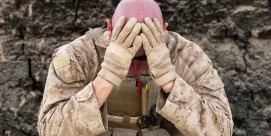In This Episode << SLIDE LEFT TO SEE ADDITIONAL SEGMENTS
Andrew Natsios Extended Interview
Read extended excerpts from the Religion & Ethics NewsWeekly interview about foreign aid with Andrew Natsios, a professor at the Georgetown University School of Foreign Service and former director of USAID:
People who say more aid is better no matter how it’s spent are wrong. If you spend it the wrong way, you could actually do damage to society…The notion of a laissez faire attitude where the government doesn’t do anything, countries won’t develop. In fact, if you want this to work you have to be careful, you have to be thoughtful, you have to take the longer term on this. It has to be a steady investment of money, and the people who do the work in the field have to understand development. A lot of political figures in the city, of both parties, think this is easy work. It’s very complicated work. There are unintended consequences, there are predatory forces in the societies, and there are reformers.
Your job in running the program is to find the reformers and protect the program against the predators. If you do that you can actually make some progress. The most important thing about this is that you have to have local political leaders who are willing to reform, to make changes, to make progress. If there are no local political leaders, aid does not work very well.
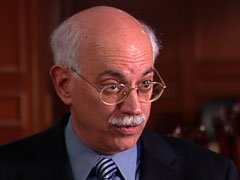 Andrew Natsios |
I think we have a number of major success stories that nobody knows about in the US. For example, the green revolution in Asia by Dr. Norman Borlag—my old agency USAID had a major role in implementing his vision. He just died at 95 years old. He probably saved 3 million people by producing high-yield variety of various staple crops in Asia….one of the greatest success stories in 1,000 years in terms of agricultural productivity.
The US does enormous good in the world, but Americans are unaware of it. We can point to South Korea, we can point to Taiwan, Turkey, Greece, Costa Rica, Chile. There are a whole bunch of countries that AID and American assistance played a major role. Now those countries also had leaders who were willing to work with us in a constructive way, not take the aid for their own purposes in some Swiss bank account. It’s a partnership. The problem with aid is now we have so many different aid agencies—the World Bank, the UN, the Europeans—and so no one can say we did this alone on our own with no one else involved. Aid never does this alone without local leadership.
If you don’t have security, economic growth doesn’t take place. People are afraid, and the government in fact is seen as incompetent. The first requirement of any government is to keep enough order so people can carry on their lives. Secondly, people don’t invest money, which is what causes economic growth in the private sector, unless there is some order. I don’t mean repressive order, but some rule of law on a minimal level. There has to be a court system, a functioning prison system. If you don’t do that, there’s no investment. Without investment there is no economic growth. You look at social services—education, health, you look at economic growth, and you look at governance. How functional is the government? Does it have any reach beyond the capital city? Haiti, for example—85 percent of the children go to parochial or private schools. Their administration of education was so poorly managed for such a long period of time it doesn’t educate most Haitian children. Fifty percent of the country is illiterate right now. One of the most important things the US, in my view, can do in Haiti is to focus on the education sector, and that is something AID has a lot of expertise in and has done very well all over the world.
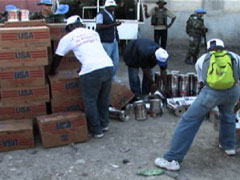 We tend to think of aid as giving people things. That is really not what this is about. It’s true when it’s an emergency in a famine or in a war or something you provide assistance in terms of commodities. The most important thing about aid is building institutions, whether they’re in the government, ministries that are functional, or nonprofit organizations, because civil society, in any healthy society like the US has a huge civil society sector and very healthy private sector. If you build all of those and you build institutions that are sustainable, the country will make progress.
We tend to think of aid as giving people things. That is really not what this is about. It’s true when it’s an emergency in a famine or in a war or something you provide assistance in terms of commodities. The most important thing about aid is building institutions, whether they’re in the government, ministries that are functional, or nonprofit organizations, because civil society, in any healthy society like the US has a huge civil society sector and very healthy private sector. If you build all of those and you build institutions that are sustainable, the country will make progress.
Certainly some of our foreign aid has been driven by domestic interest groups that benefit from the sale of commodities or whatever from the US. There are certainly instances where we have given assistance to countries where there’s a dictator who is allied with us. My view is that people’s motives in the government are always mixed. Even at AID, the State Department, or the Defense Department., motives change from one day to another. I don’t think we should look at motives. I think we should look at what we are doing. If you have a very well-intentioned, pure in terms of their motives, pure development program that’s screwed up, that really hurts the country, how is that good? If you have people with very parochial motives, very narrowly focused, and you do the right thing, that’s good development assistance. From my perspective, what’s important is what you do with the money in the field, on the ground, in the country.
I think there’s a huge information gap between Washington—and I don’t just mean the White House or the Congress, I mean the media, interest groups, think tanks—between how they perceive our aid program and how the people in the developing world do. In fact, if you go to the developing world, people think USAID is the greatest American institution. No one says that in Washington. They beat up the agency all the time. They never ask the people in the field what they think. I think people don’t understand in the US how powerful our aid program is for the people in the field, in these countries, who need our help. There’s a different AID in the developing world, in poor countries. That’s where most of our staff is. In those countries, AID is the most important American institution, an institution they look to for assistance and support for reforms and improvements in people’s lives. The most powerful part of what we do abroad, in my view, is our aid program.
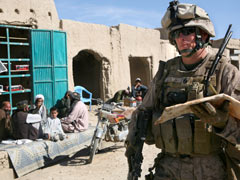 We actually stopped, in the mid-1990s, the US aid program, giving money directly to governments, except where there’s a strategic interest. For example, in Afghanistan, or in Pakistan, we wanted them to be allies in the war against terror. We might do what we call budget support, where we give money to their treasury. We don’t do that in most countries anymore because we’ve had a mixed record of success with it. Some of the money disappeared. If you put money in a dysfunctional institution, the money often gets misspent—not necessarily stolen, but misspent. So it has to be done very carefully. There are ways to help governments without giving them a check, and that, I think, our aid program does well. It’s through technical assistance, through scholarship programs, and training programs…. Those kinds of programs aren’t putting money into governments, but they are training people in the government in programs that would increase their capacity.
We actually stopped, in the mid-1990s, the US aid program, giving money directly to governments, except where there’s a strategic interest. For example, in Afghanistan, or in Pakistan, we wanted them to be allies in the war against terror. We might do what we call budget support, where we give money to their treasury. We don’t do that in most countries anymore because we’ve had a mixed record of success with it. Some of the money disappeared. If you put money in a dysfunctional institution, the money often gets misspent—not necessarily stolen, but misspent. So it has to be done very carefully. There are ways to help governments without giving them a check, and that, I think, our aid program does well. It’s through technical assistance, through scholarship programs, and training programs…. Those kinds of programs aren’t putting money into governments, but they are training people in the government in programs that would increase their capacity.
If aid becomes too high a percentage of the GNP of the country, it has a distorting effect on incentives. That doesn’t mean we don’t give aid. There’s a limit on how much aid we should give. I think that’s an insight that we’ve sometimes have lost. People who say if you just give more aid, like Jeff Sachs argues, everything will be fine and poverty will be eliminated, is nonsense. On the other hand, we know that some aid carefully targeted for the right sectors under the right circumstances can actually accelerate the country’s development and economic progress and their movement toward democratic governance.
The Obama administration, I think with good intentions, but it has become a disaster, believes in a whole-of-government approach. If the whole of government means take the Department of AID, that’s fine, they’re geared towards the world. Having domestic agencies get involved increasingly under Republican and Democratic administrations is a very bad idea. Many domestic agencies have special interest groups that control them. The Department of Agriculture, for example, has been one of the major factors trying to stop AID’s agriculture program because they will actually say it to you. “We don’t want them growing more food. Then they won’t buy American food,” which, by the way, is nonsense. We had a huge agriculture development program in India, very successful. India still imports huge amounts of food from the US of certain kinds, so these interest groups have a growing influence on our AID’S program, because every federal department has their own international aid program, which we did not have during the cold war. During the cold war, by an order by President Nixon in the late ’60s, all foreign aid had to be spent through AID….They controlled the money. That collapsed in the early 1990s as a discipline. I think we need to go back to that. I think the whole-of-government approach is well-intentioned and badly mistaken.
People in domestic agencies don’t understand that they are dealing with countries with a completely different social and economic structure and political system who have completely different values and different worldview than we do. What works here doesn’t necessarily work in the developing world. Every country is different, and one of the most important parts of an aid agency is how decentralized they are. The most important part of the management of an aid agent is that it be decentralized and that aid programs be designed for the culture and the history and the social order of the country that we are working in. Standardizing all aid programs all over the world is a very bad idea….I proposed to President [George W.] Bush that we start spending 25 percent of our food aid budget on local purchases, which means we buy the food in the country, in surplus areas, and move it to an area where people are dying or are in trouble because of a war. He put it in his budget for four years. We could not get it through Congress because the shippers and the maritime unions opposed it, the grain producers opposed, and the grain processors opposed it, and even some of the NGOs opposed it….We know by buying food locally you stimulate production, you stimulate agriculture growth and productivity. It’s much faster; it is 4 months faster if you buy it locally than it is to ship it, because it takes so long to ship it in the middle of an emergency in particular, and 30 percent of the cost of our food aid is transportation cost. I’ve seen children starve to death when there was a surplus of food in their local markets, but there was no one to buy the food because we didn’t have the money to do that, so people died. What happened now is we gave up trying to get it through Congress. It wasn’t the foreign affairs committee that was the problem; it was the agriculture committee in Congress controls the food budget, not the foreign affairs committee, which was very sympathetic to this change or this reform. What happened is that AID proposed a separate account that didn’t affect the food aid budget, I think has $265 million in it, to buy food locally or regionally in an area and to intervene in the markets when there are massive food price increases which can cause chaos in people’s nutrition, and this went through this year. It’s a major reform, the first time AID has had that authority and budget to do this, but it took 5 years to do it because powerful interest groups did not want the change made.
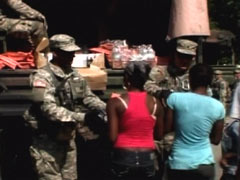 The military fights wars. We need them to do that. I don’t think they do aid very well. They don’t understand institution building; they tend to take a shorter-term, like the State Department does, a shorter-term view of development. Our programs to be successful you need 10 years, not 2 years, not 6 months, and one of the problems of our aid program that there is so much pressure from the Pentagon and the State Department for immediate results, in 6 months or a year, that we distort the aid program. We know that we can’t produce effective programs to build institutions in 6 months or a year is ridiculous. It can’t be done. I think the military is doing this because they perceive a weakness, and the weakness they see is this: that between 1980 and now there was a huge reduction in the workforce of AID. In the 1990s, when the cold war was over, people said we don’t need aid anymore, there was no communist threat. In fact, there was no threat to the US and so we laid off a lot of very senior officers of AID. We went from 4,000 direct-hire foreign officers and civil servants to 2,200 when I arrived in 2001. There was a massive reduction in the workforce. These were very senior level, and they were among the most able officers, and they were laid off. That meant when the war in Iraq started and the war in Afghanistan started, we didn’t have enough officers to send into the field, so the military said we will do it. I don’t think they did it very well, frankly. Do we need the military for security? Absolutely. The argument that the NGOs make…they say they want to be independent from the military in Afghanistan. The reality is that the Afghans and Taliban, the al-Qaeda forces see any Westerner as hostile to them. The argument that their neutrality is compromised by working with the military doesn’t hold water. My problem is not the neutrality argument; my problem is that the military doesn’t know how to do it very well.
The military fights wars. We need them to do that. I don’t think they do aid very well. They don’t understand institution building; they tend to take a shorter-term, like the State Department does, a shorter-term view of development. Our programs to be successful you need 10 years, not 2 years, not 6 months, and one of the problems of our aid program that there is so much pressure from the Pentagon and the State Department for immediate results, in 6 months or a year, that we distort the aid program. We know that we can’t produce effective programs to build institutions in 6 months or a year is ridiculous. It can’t be done. I think the military is doing this because they perceive a weakness, and the weakness they see is this: that between 1980 and now there was a huge reduction in the workforce of AID. In the 1990s, when the cold war was over, people said we don’t need aid anymore, there was no communist threat. In fact, there was no threat to the US and so we laid off a lot of very senior officers of AID. We went from 4,000 direct-hire foreign officers and civil servants to 2,200 when I arrived in 2001. There was a massive reduction in the workforce. These were very senior level, and they were among the most able officers, and they were laid off. That meant when the war in Iraq started and the war in Afghanistan started, we didn’t have enough officers to send into the field, so the military said we will do it. I don’t think they did it very well, frankly. Do we need the military for security? Absolutely. The argument that the NGOs make…they say they want to be independent from the military in Afghanistan. The reality is that the Afghans and Taliban, the al-Qaeda forces see any Westerner as hostile to them. The argument that their neutrality is compromised by working with the military doesn’t hold water. My problem is not the neutrality argument; my problem is that the military doesn’t know how to do it very well.
If you want a functioning aid program, you have to have employees to do it. Rebuilding the work force is a major effort to improve the quality of our programming and to put the aid troops, not military troops, on the ground to carry these programs out.
There’s a little bit of tension between the White House and the State Department. My sense is that the president and his staff want a more independent AID. Secretary Clinton is not hostile to AID. She likes AID and she likes foreign aid. She likes the program, but she wants to control it. What is happening now is that the State Department is absorbing AID slowly by stealth…They are taking over the business systems. AID’s independence is compromised almost every week now, and the consequences—even though they are restaffing the agency, the competence of the agency as a development institution, the more it gets absorbed into State will be limited, in my view. If AID is absorbed into State, it will compromise the integrity of our development program. I don’t think the political appointees of State understand what development is. They don’t know how this stuff works, and this doesn’t make any difference in which party you are in…It doesn’t matter what your ideology is. If this was simple we would have done this a long time ago. It’s very complicated work, and you need career, professional people…
We shipped food aid into Afghanistan in 2002 because a famine was developing, and at the same time we were importing a new seed, improved seed variety to grow more wheat and because of good rains and because of the seed program, the agriculture program, the Afghan farmers produced the biggest wheat crop in history. Prices collapsed 20 percent of their normal level, and instead of buying the surplus wheat, the farmers stopped harvesting the wheat because the prices were so low it wasn’t worth harvesting it, and as a result of that, they let the harvest rot in the fields…The next year there was a massive increase in poppy production for heroin because they said we can make money on heroin. You can’t make money on wheat. We imported 300,000 tons of American wheat and food when there was all this large surplus. I try to say to people it’s nice to have an agriculture program; you can’t import 300,000 tons of wheat when there is all this wheat they just grew. But we don’t want to offend the interest groups in the US. If we had bought the food locally the price would have remained stable, and they probably wouldn’t have moved toward more poppy production, because poppies are against Islam. It’s a violation against Islamic teaching to grow poppies. So the Afghans did it out of desperation. Our staff on the ground said you need to buy this food locally, couldn’t do it because the statute wouldn’t allow us to.
The military went into the area where Bin Laden was in….They went into a village and said we will electrify your village, and they did it. They electrified the village, they put a generator in and gave them enough fuel for a month, and the town for the first time in their history had electricity. At the end of the 30 days, the diesel fuel ran out and there was no electricity, and they came to us and said we are very angry now. We had light, now we have darkness. Why did you build an electrical system for our town and not give us enough fuel forever? Building them programs that are sustainable is very difficult. We should have set up a system…It’s simple to electrify a village. It’s very hard to set up a system to get people to pay and fund voluntarily to keep buying diesel fuel needed to keep the generator working. That’s a much more complex task, and it takes a lot of time to do that.
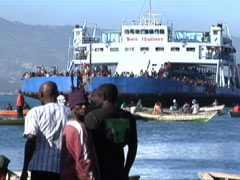 If we are very serious about helping the Haitians rebuild, then we need to do an aid program and a trade program too. We need to open American markets to trade in a new industry growing in Haiti. The first thing we need to do is to hold down any trade barriers between the two countries. Secondly, we need a program to encourage the Haitian government, to tell them how to create the incentives for private investment in factories to do assembling of shoes or hats or clothes. Even though the earthquake was in the city, the poorest people in Haiti live in rural areas. You don’t want everybody coming into the city that’s been rebuilt, from the rural areas, because it will become overcrowded, so an agriculture development program not for just subsistence, that people grow what they eat, but for export of certain types of crops to the US, tropical crops that are useable in American markets.
If we are very serious about helping the Haitians rebuild, then we need to do an aid program and a trade program too. We need to open American markets to trade in a new industry growing in Haiti. The first thing we need to do is to hold down any trade barriers between the two countries. Secondly, we need a program to encourage the Haitian government, to tell them how to create the incentives for private investment in factories to do assembling of shoes or hats or clothes. Even though the earthquake was in the city, the poorest people in Haiti live in rural areas. You don’t want everybody coming into the city that’s been rebuilt, from the rural areas, because it will become overcrowded, so an agriculture development program not for just subsistence, that people grow what they eat, but for export of certain types of crops to the US, tropical crops that are useable in American markets.
The police force is very corrupt in Haiti. They were associated with the gangs that were terrorizing the population before the earthquake, and they are connected to the drug trade from Latin America. There has been an effort by the UN to reform the police force—
retrain and relieve the corrupt police, properly pay them—that is a very important undertaking. I don’t think the UN has enough money to do this. I think the Canadians took the lead on that. I think it’s very important to have a functioning police force, to have some order and a police force that’s honest. If the Haitian ministries don’t function very well—the education, the health ministry, public works ministry—then we can do all the work we want to, but as soon as we leave, as soon as a road is rebuilt and we leave, things will start deteriorate unless it’s maintained. Maintenance requires institution-building of the ministries, so we need to do some work to build the capacity of the Haitian ministries to administer public services in the country.
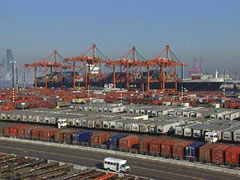 There is a problem that the educated elites, they all left in the 1990s during the sanctions. They came here. One of the most upwardly mobile ethnic group in the US are the Haitian Americans and the Canadian Haitians. I think what we should do is to run a program, which we ran originally in Afghanistan with some success, to bring people from the Haitian diaspora who come from Haiti originally to move back to help rebuild the ministries, to run a lot of these development projects. We need Haitian Americans and Canadian Haitians to come back and take a leadership role in the reconstruction effort. In.that way, we will respect the traditions of their country and bring people who understand their culture and their way of life in leadership roles in a critical moment. Since the power structure was devastated by this earthquake it may be easier actually to make the change right, to bring educated Haitians back from the US to do this.
There is a problem that the educated elites, they all left in the 1990s during the sanctions. They came here. One of the most upwardly mobile ethnic group in the US are the Haitian Americans and the Canadian Haitians. I think what we should do is to run a program, which we ran originally in Afghanistan with some success, to bring people from the Haitian diaspora who come from Haiti originally to move back to help rebuild the ministries, to run a lot of these development projects. We need Haitian Americans and Canadian Haitians to come back and take a leadership role in the reconstruction effort. In.that way, we will respect the traditions of their country and bring people who understand their culture and their way of life in leadership roles in a critical moment. Since the power structure was devastated by this earthquake it may be easier actually to make the change right, to bring educated Haitians back from the US to do this.
Trade is an essential part of economic growth. There is no real example of a country leaving the ranks of the poorest countries and becoming a middle-income country without an export-based strategy. We know that it works, and all the Asian examples are export countries. However, you can not do it in absence of aid. If there’s no port to ship the goods, how do you receive fertilizer from another country if there is no port? If you are exporting something that you’ve produced and there is no airport, how do you ship the goods out? Third, you need roads. Private businesses don’t build roads. The government needs to build roads. You need an educated workforce. Trade is essential, but it’s not trade or aid, it’s trade and aid. The two things have to be married together, and there’s another thing the US has done very well all over the world, and I’m hoping one of the central things that the Obama administration does in Haiti is trade capacity-building within the Haitian business community and the ministries to put in place policies that encourage business growth, development, new jobs in both the rural areas and the urban areas.
Our biggest aid budgets have been when we faced threats from abroad. The biggest aid budgets were in the 1940s, ’50s and ’60s when the Soviet Union was a threat, and we did some very good things with that money. The argument that we should separate our aid program from our policy to me doesn’t make a lot of sense.
Good motives don’t mean good programs, and sometimes people with very parochial motives provide money for AID to do some very good things. So it’s not what your motives are, it’s what you do with the money once you get it. That’s what is important.


